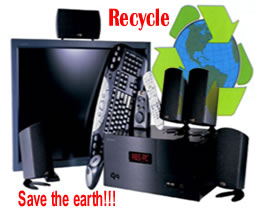
APEX! Computer Recycle |
WHY RECYCLE? |
| As we become more dependent on electronic products to make life more convenient, the stockpile of used and obsolete products grows. The National Safety Council1 projects that nearly 250 million computers will become obsolete in the next five years and mobile phones will be discarded at a rate of 130 million per year by 2005. Also, millions of TVs are heading for landfills due to recent digital and high definition technology upgrades. These alarming numbers are only to increase as we see new electronic game consoles and telecommunication devices hit the market. Computer monitors and older TV picture tubes contain an average of four pounds of lead and require special handling at the end of their lives. In addition to lead, electronics can contain chromium, cadmium, mercury, beryllium, nickel, zinc, and brominated flame retardants. When electronics are not disposed of or recycled properly, these toxic materials can present problems. Cadmium can accumulate in,and negatively impact, the kidneys. Cadmium is persistent, bio accumulative, and toxic. The principal exposure pathway is through respiration and through our food. Lead can cause damage to the central and peripheral nervous systems, blood systems, and kidneys in humans. Lead has also been shown to have negative effects on the development of children's brains. Lead can accumulate in the environment and have a detrimental effect on plants, animals, and humans. Consumer electronics may be responsible for 40% of the lead found in landfills. The principal pathway of concern is lead leaching from landfills and contaminating drinking water supplies. When mercury make sits way into waterways, it is transformed into mentholated mercury in the sediments. Mentholated mercury accumulates in living organisms and travels up the food chain. Mentholated mercury can cause brain damage. The principal exposure pathway is through our food. Chromium VI can damage DNA and has been linked to asthmatic bronchitis. The major pathways are through landfill leachate or from fly ash generated when materials containing Chromium VI are incinerated. Although less is known about BFRs than some other contaminants of concern, but research has shown that one of these flame retardants, Polybrominated Diphenylethers (PDBE) might act and an endocrine disrupter. Flame retardant (Polybrominated Biphenyl's (PBB) may increase cancer risk to the of the digestive and lymph systems. Once released into the environment through landfill leachate and incineration they are concentrated in the food chain. |

